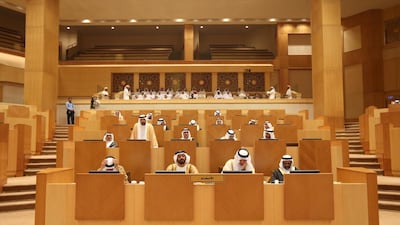ABU DHABI // Some members like to be in the spotlight during Federal National Council sessions, while others have preferred to keep a low profile even though speaking during sessions is vital to show the public how active they are. Yet a number of members who rarely speak, including a few of the female members, are some of the highest achievers when outside FNC chambers.
Sultan Al Dhaheri (appointed, Abu Dhabi) and Dr Yaqoub Al Naqbi (appointed, Sharjah)
Each has asked just one question of a minister. Aside from that, neither has spoken more than a handful of times during public sessions. Their work beyond the council chambers, however, rings louder. Mr Al Dhaheri, a well-known businessman, compensates for his quietness during public sessions with his activity on the council’s finance committee, which he chairs. Outside the council, Mr Al Dhaheri holds several posts at commercial and industrial companies.
He is also known for his philanthropy. In 2012, he donated US$1 million (Dh3.67m) to the Young Future Energy Leaders programme at Masdar Institute of Science of Technology.
Dr Al Naqbi also carries a heavy load as the chairman of the Interior and Defence Committee.
He did invite a government official to the chambers once, questioning the governor of the Central Bank, Sultan Al Suwaidi, how the organisation was monitoring commercial banks to ensure their Islamic services were Sharia-compliant.
During the discussion, Dr Al Naqbi said he would like to see Islamic banking branches made independent from commercial banks, have their own budget and management, and be monitored by a separate authority.
The governor said they would look into making Islamic services independent from the commercial side of the bank.
Female members
The majority of women in the FNC take stands regularly, adding their voices to discussions, particularly those involving women and children.
But they are only seven of the 40-member council, which has led some to believe they do not fully participate.
Even though the Speaker sometimes is unable to make his way through all the members in order to give them the floor, female members’ hands are usually raised along with their male counterparts, eager to voice their views.
Saeed Al Khateri (elected, RAK) and Gharib Al Suridi (elected, Fujairah)
Although quiet, both members are welcoming and happy to listen to Emiratis’ issues, particularly given that both are elected members. Some of the requests passed to them, however, have yet to make their way to the council.
Mr Al Khateri, for example, a retired army officer with a master’s degree in military science, opened his majlis to Emiratis after he was elected, where they spoke to him about the retirement age of teachers, the shortage of late-night hospital staff and employment options for graduates.
He has asked Humaid Al Qattami, the Minister of Education, about jobs for unemployed Emiratis, particularly graduates of the Higher Colleges of Technology and school dropouts.
Obaid bin Rakad (elected, UAQ)
The member asked about the state of a school in Umm Al Quwain that was built in 1981.
Although he followed up on the original query by questioning the Minister of Education, Humaid Al Qatami, several times, asking why the school had not been renovated, he has not been very vocal again in the council, except for a number of times during law and general topic discussions.
osalem@thenational.ae

